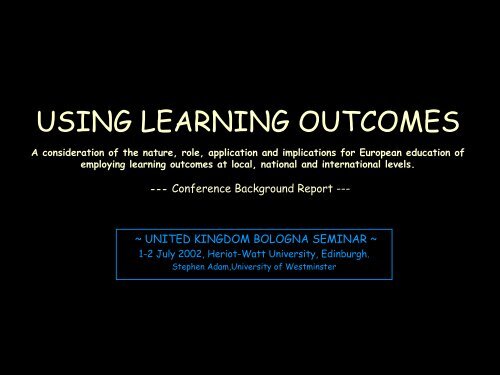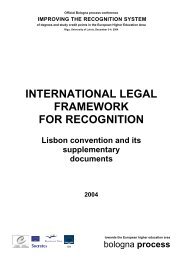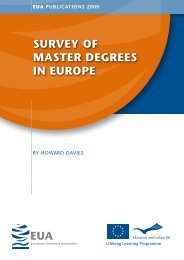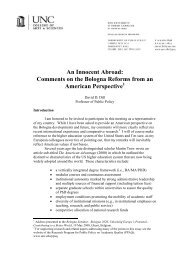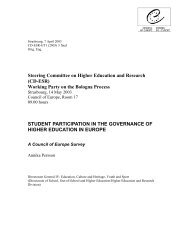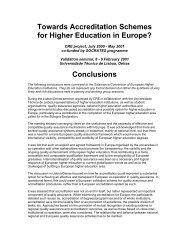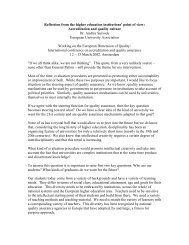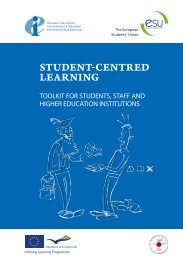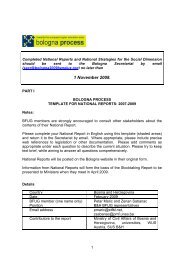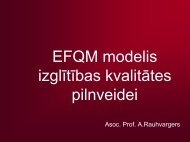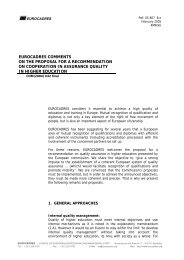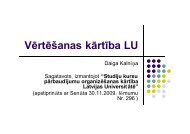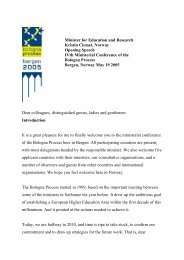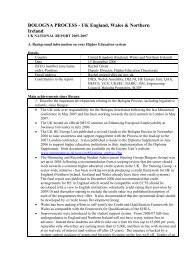USING LEARNING OUTCOMES A consideration of the nature, role ...
USING LEARNING OUTCOMES A consideration of the nature, role ...
USING LEARNING OUTCOMES A consideration of the nature, role ...
- No tags were found...
Create successful ePaper yourself
Turn your PDF publications into a flip-book with our unique Google optimized e-Paper software.
<strong>USING</strong> <strong>LEARNING</strong> <strong>OUTCOMES</strong>A <strong>consideration</strong> <strong>of</strong> <strong>the</strong> <strong>nature</strong>, <strong>role</strong>, application and implications for European education <strong>of</strong>employing learning outcomes at local, national and international levels.--- Conference Background Report ---~ UNITED KINGDOM BOLOGNA SEMINAR ~1-2 July 2002, Heriot-Watt University, Edinburgh.Stephen Adam,University <strong>of</strong> Westminster
<strong>USING</strong> <strong>LEARNING</strong> <strong>OUTCOMES</strong>REPORT CONTENTS:Section 1 - Context and IssuesSection 2 - Learning outcomes in EuropeSection 3 - Learning outcomes and <strong>the</strong> Bologna processSection 4 - Issues for <strong>consideration</strong>
1. Context and IssuesINTRODUCTION:‘Degree structure: ‘Ministers encourage <strong>the</strong> member states to elaborate aframework <strong>of</strong> comparable and compatible qualifications for <strong>the</strong>ir highereducation systems, which should seek to describe qualifications in terms <strong>of</strong>workload, level, learning outcomes, competences and pr<strong>of</strong>ile. They alsoundertake to elaborate an overarching framework <strong>of</strong> qualifications for <strong>the</strong>European Higher Education Area.’‘Within such frameworks, degrees should have different defined outcomes.First and second cycle degrees should have different orientations andvarious pr<strong>of</strong>iles in order to accommodate a diversity <strong>of</strong> individual, academicand labour market needs. First cycle degrees should give access, in <strong>the</strong>sense <strong>of</strong> <strong>the</strong> Lisbon Recognition Convention, to second cycle programmes.Second cycle degrees should give access to doctoral studies.’Berlin Communiqué
1. Context and IssuesINTRODUCTION:• Problem – ubiquity <strong>of</strong> references coupled with relatively poorunderstanding and practical usage (may slow development <strong>of</strong> <strong>the</strong> EHEA).• Learning outcomes can be regarded as basic educational building blocksthat impact at <strong>the</strong> local, national and international levels.• Have a major <strong>role</strong> in curriculum design/development.• Potential to integrate VET and HE.• Part <strong>of</strong> a paradigm shift - teaching to learning (student-centredlearning).• Dangerous antecedents – Pavlov, Watson and Skinner!
Paradigm shift …Teacher-centred:• Teachers serve as <strong>the</strong> centre <strong>of</strong> epistemological knowledge, directing<strong>the</strong> learning process and controlling students' access to information.• Students are viewed as 'empty vessels’ and learning is viewed as anadditive process.• Instruction is geared for <strong>the</strong> 'average' student and everyone isforced to progress at <strong>the</strong> same rate.Student-centred:• Students are not passive. They come with <strong>the</strong>ir own perceptualframeworks (Erikson, 1984).• Students learn in different ways (Briggs-Myers, 1980; Kolb,1984).• Learning is an active dynamic process (Cross,1991).• Students construct <strong>the</strong>ir own meaning by talking, listening, writing,reading, and reflecting on content, ideas, issues and concerns(Meyers and Jones, 1993).(Source: University <strong>of</strong> Bath)
However, <strong>the</strong> dichotomy betweenteacher- and student-centred is not socrude or stark in practice!Be quiet andwrite downeverything Isay!
Dangerous antecedents: Pavlov (+ salivatingdogs) + Watson,Skinner.
1. Context and IssuesPOSITIVE AND NEGATIVE ASEPCTS (Controversial area):NEGATIVE (Philosophical + technical):• Inhibits/constricts <strong>the</strong> learning process• Suits training better than open-ended higher education• Creates a target-led culture• Attacks <strong>the</strong> liberal conception <strong>of</strong> <strong>the</strong> university• Technically difficult and expensive to introduce + resented by staffPOSITIVE (Course design, learner, national, international):• Helps ensure consistent delivery across programmes <strong>of</strong> learning• Provides more precision to course design + stops overlap• Informs student choice• Highlights teaching, learning,assessment relationship• Benefits quality assurance• Potential to link vocational education & training(VET) & higher education (HE)• Improved national/international recognition and transparency <strong>of</strong> qualifications
1. Context and IssuesALTERNATIVES TO THE USE OF <strong>LEARNING</strong> <strong>OUTCOMES</strong>:• Most countries express <strong>the</strong>ir curriculum in terms <strong>of</strong> what <strong>the</strong>student will cover – <strong>the</strong> course content.• An input-focused approach is employed.• Programmes are expressed in terms <strong>of</strong> time taken, accessrequirements, staffing and resources.• Qualification descriptions are articulated in general terms,<strong>of</strong>ten in relation to o<strong>the</strong>r qualifications (higher or lower) inundeveloped qualification frameworks.• A strong emphasis is put on student workload (time measures).
1. Context and Issues<strong>LEARNING</strong> <strong>OUTCOMES</strong> AND EDUCATIONAL REFORM:• The use <strong>of</strong> learning outcomes is intimately linked to <strong>the</strong>adoption <strong>of</strong> student-centred learning.• Learning outcomes are a integral part <strong>of</strong> output-focusedapproach to teaching, learning and assessment.• The <strong>role</strong> <strong>of</strong> <strong>the</strong> teacher moves towards being afacilitator/manager <strong>of</strong> <strong>the</strong> learning process.• Learning outcomes relate to external reference points(qualifications descriptors, levels, level descriptors, subjectbenchmark statements) that constitute ‘new style’ qualificationframeworks.
2. Learning Outcomes in EuropeAlbania Latvia AndorraLiechtensteinAustria Lithuania Belgium LuxembourgBosnia and Herzegovina Malta Bulgaria Ne<strong>the</strong>rlands Croatia Norway Cyprus Poland Czech Republic Portugal Denmark RomaniaEstonia Russian Federation Finland Serbia and MontenegroFrance Slovak Republic Germany Slovenia Greece Spain Holy See Sweden Hungary Switzerland Iceland"<strong>the</strong> former Yugoslav Republic <strong>of</strong> Macedonia"Ireland Turkey Italy United Kingdom
2. Learning Outcomes in EuropeCOUNTRY REPORT ANALYSIS/CONCLUSIONS:WARNING!• Simple one-question survey• Some terminological confusions• No opportunity to explore situation• Snapshot picture only
2. Learning Outcomes in EuropeCOUNTRY REPORT ANALYSIS/CONCLUSIONS:• Considerable activity across Europe (97%).• Most developed systems: Denmark, Hungary, Ireland Italy, SlovakRepublic, Spain, Sweden, UK and Belgium (Flanders).• Considerable bottom-up activities reported (34%).• Majority <strong>of</strong> activity top-down (52%).• Several countries linked efforts with <strong>the</strong> Bologna process (21%).• No countries made any link with student-centred learning (SSL).• In some countries activity focused on <strong>the</strong> non-university HE.• There is a strong desire to share information and good practice.
3. Learning Outcomes & <strong>the</strong> Bologna ProcessCONTRIBUTION TO THE 10 BOLOGNA ACTION LINES:1. Adoption <strong>of</strong> easily readable and comparable degrees:• Aids existing recognition tool + makes qualifications more transparent• Makes credential evaluation easier + improves judgements2. A system essentially based on two (three) main cycles:• Effective cycle, level and qualification descriptors depend on learning outcomes• Effective NQF + EQF are built on learning outcomes3. Establishment <strong>of</strong> a series <strong>of</strong> credits:• The evolution <strong>of</strong> ECTS will depend on credits expressed in terms <strong>of</strong> LO• Allows <strong>the</strong> quantification <strong>of</strong> learning achievement from different contexts4. Promotion <strong>of</strong> mobility:• Curriculum transparency helps student exchange + recognition <strong>of</strong> studies• Promotes precise judgements about <strong>the</strong> curriculum
5. Promotion <strong>of</strong> cooperation in quality assurance:• Building on common methodological approaches (LO) improves QA• Adoption <strong>of</strong> external reference points helps to develop universal standardsand accurate cross-border judgements about qualifications and QA systems6. Promotion <strong>of</strong> European dimension in higher education:• LO facilitates <strong>the</strong> fit and design <strong>of</strong> joint degrees + makes study programmecomponents transparent7. Lifelong learning• Credits based on LO are <strong>the</strong> only tool to link VET and HE• Credits linked to levels can create all-encompassing credit and qualificationsframeworks for lifelong learning8. Higher education and students:• The employability <strong>of</strong> students is enhanced by highlighting generic skills andcompetences• Student-centred learning involves active learning + a better learningexperience9. Attractiveness <strong>of</strong> <strong>the</strong> European Higher Education Area:• A modern, effective, efficient, world-leading education zone is facilitatedby <strong>the</strong> adoption <strong>of</strong> LO
3. Learning Outcomes & <strong>the</strong> Bologna ProcessLINKS TO OTHER CURRENT INTITIATIVES:Tuning Educational Structures in Europe Project– Raising Europe-wide consciousness on learning outcomes– Identifies generic and subject specific competences– Has mapped subject areas + developing common subject reference points– Exploring <strong>the</strong> relationship between LO, teaching, learning and assessmentJoint/dual awards– LO aid integrated curricula and promotion <strong>of</strong> <strong>the</strong> European dimension– LO have a potentially vital <strong>role</strong> to play in <strong>the</strong> development <strong>of</strong> joint degreesvia detailed comparisons and articulation <strong>of</strong> programmesRecognition tools– 2002 ‘Bologna’ recognition seminar in Lisbon + 2003 Vaduz statement byENIC/NARICs emphasised <strong>the</strong> importance <strong>of</strong> LO– LO have a positive <strong>role</strong> to play in EUROPASS
Development <strong>of</strong> ECTS– ECTS is in a period <strong>of</strong> transition from credit transfer to accumulation– ECTS credits redefined in terms <strong>of</strong> LO and notional learning time– Pr<strong>of</strong>ound impact/implications for lifelong learning + EQFQuality assurance developments– Evidence that European Network for Quality Assurance in HigherEducation (ENQA) is moving towards an output model for QA– Transnational European Evaluation Project (TEEP) explored <strong>the</strong> use <strong>of</strong>output approached (Dublin Descriptors + Tuning) for <strong>the</strong> purposes <strong>of</strong>external evaluationOverarching European qualifications framework– There is a fundamental link between LO and new style qualificationsframeworks (National & overarching European Qualifications framework)– New qualifications frameworks share a methodology and tools based onlearning outcomes (level, level and qualifications descriptors, etc.)– LO link to <strong>the</strong> development <strong>of</strong> credit based EQF for lifelong learning
Levels <strong>of</strong> application – learning outcomes have pr<strong>of</strong>oundimplications at <strong>the</strong>:1. Institutional/local level:For <strong>the</strong> curriculum, teaching, learning and assessment.2 National:For <strong>the</strong> <strong>nature</strong> and expression <strong>of</strong> national qualificationsframeworks (NQF) and quality assurance regimes.3. International:For developing EQF + tools used to express it – cycle andlevel descriptors. For a massive increase in transparency,mobility and recognition.
4. Issues for ConsiderationGENERAL QUESTIONS:• What is <strong>the</strong> appropriate <strong>role</strong> <strong>of</strong> learning outcomes in <strong>the</strong> European HigherEducation Area – do <strong>the</strong>y have a positive contribution?• Can learning outcomes contribute to all three Bologna cycles?• What are <strong>the</strong> implications <strong>of</strong> learning outcomes for governments, ministriesand national authorities - how do <strong>the</strong>y relate to quality assuranceframeworks and qualifications frameworks?• What contribution do learning outcomes make to <strong>the</strong> development <strong>of</strong> ECTS,lifelong learning and <strong>the</strong> linking <strong>of</strong> VET and HE – and what are <strong>the</strong> nationaland international implications <strong>of</strong> this? Can national parallel frameworks forvocational and academic education be linked by <strong>the</strong> common use <strong>of</strong> learningoutcomes?• How might learning outcomes contribute to <strong>the</strong> development <strong>of</strong> qualityassurance at <strong>the</strong> European level? How can national and internationallyaccepted threshold standards (and descriptions <strong>of</strong> learning) be developed?• What are <strong>the</strong> implications <strong>of</strong> learning outcomes for higher educationinstitutions (at module and programme level)?• How can good practice and experience associated with <strong>the</strong> development andimplementation <strong>of</strong> learning outcomes be shared, and is a top-down or bottomupor a mixed approach more effective?
4. Issues for ConsiderationTECHNICAL QUESTIONS:• Do we need to develop common definitions and understandings about learning outcomesand <strong>the</strong>ir expression, and if so, how?• Is it useful to distinguish between subject specific and generic learning outcomes?• What are <strong>the</strong> implications <strong>of</strong> learning outcomes for <strong>the</strong> normative versus criterionreference assessment debate – if credits or any learning is expressed in terms <strong>of</strong>learning outcomes does this dictate <strong>the</strong> adoption <strong>of</strong> a criterion-led approach toassessment?• Does <strong>the</strong> widespread adoption <strong>of</strong> learning outcomes necessitate any updating <strong>of</strong>existing recognition tools e.g. recognition conventions, good practice guidelines,EUROPASS, ECTS, etc?• Should we seek some practical agreement about <strong>the</strong> <strong>role</strong> <strong>of</strong> learning outcomes in terms<strong>of</strong> cycle descriptors, levels, level indicators, qualification descriptors and subjectbenchmark statements?• Should learning outcomes at module level be written as threshold statements?• Are credits vacuous without learning outcomes?• What are <strong>the</strong> local, national and international implications <strong>of</strong> adopting an outcomesbaseddefinition <strong>of</strong> ECTS credits?• How does workload relate to learning outcomes and how can workload most effectivelybe expressed?
FINAL THOUGHTS BY TWO SUPPORTERS OF <strong>LEARNING</strong> <strong>OUTCOMES</strong>…Oscar Wilde:‘Education is anadmirable thing,but it iswell to remember fromtime to time that nothingthat is worth knowing canbe taught.’Aristotle:‘What we haveto learn to do,we learn bydoing.’
Learning outcomesact as a form <strong>of</strong>‘educational Viagra’- by stimulatinghigher education andinvigorating <strong>the</strong>European HigherEducation Area?


